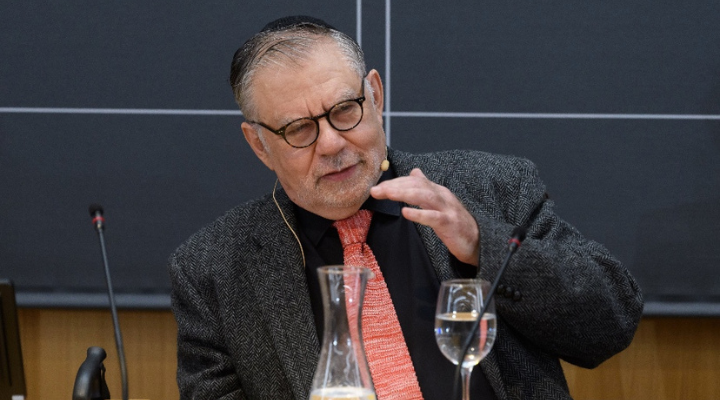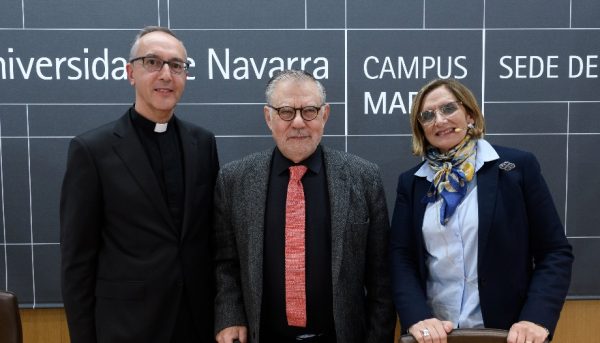
The Aula Magna of the headquarters of the University of Navarra in Madrid hosted the Omnes-CARF Forum on "The Spiritual Crisis of Europe". A topic that has aroused great expectation translated into the large audience that has gathered at this meeting.
Alfonso Riobó, director of Omnes, opened this Omnes-CARF Forum thanking the speakers and attendees for their presence and highlighting the intellectual and human level of Professor Weiler, who becomes the third Ratzinger Prize winner to attend an Omnes-CARF Forum. Likewise, the director of Omnes thanked the sponsors, Banco Sabadell and the Religious Tourism and Pilgrimages section of Viajes el Corte Inglés for their support in this Forum as well as the Master of Christianity and Culture of the University of Navarra.
Professor María José Roca moderated the session and introduced Joseph Weiler. Roca pointed out the defense of "that a plurality of visions is possible in Europe in a context of respect for rights". embodied by Professor Weiler who represented Italy before the European Court of Human Rights in the Lautsi v. Italy case, which ruled in favor of freedom from the presence of crucifixes in Italian public schools.
Weiler began his dissertation by stressing how "the crisis that Europe is experiencing is not only political, defensive or economic. It is a crisis, above all of values". In this area, Weiler explained the values which, in his opinion, underpin European thinking and which he called "the European trinity": "the value of democracy, the defense of human rights and the rule of law".
These three principles are the basis of European states, and are indispensable. We don't want to live in a society that doesn't respect those values, Weiler maintained, "but they have a problem, they are empty.They can go in a good direction or in a bad direction".
Weiler has explained this emptiness of principles: democracy is a technology of government; it is empty, because if there is a society where the majority were bad people, there would be a bad democracy. "Likewise, the indispensable fundamental rights give us freedoms, but what do we do with that freedom? Depending on what we do, we can do good or bad; for example, we can do a lot of bad things protected by the freedom of expression".
Finally, Weiler pointed out, the same applies to the rule of law if the laws it emanates are unjust.
Faced with this reality, Weiler has defended his postulate: the human being seeks "to give a meaning to our life that goes beyond our personal interest".
Before World War II, the professor continued, "this human desire was covered by three elements: family, Church and homeland. After the war, these elements disappeared; and this is understandable, if we take into account the connotation with, and abuse by, the fascist regimes. Europe becomes secular, churches are emptied, the notion of patriotism disappears and the family disintegrates. All this gives rise to a vacuum. This is the origin of Europe's spiritual crisis: "its values, 'the European holy trinity' are indispensable, but they do not satisfy the search for meaning in life. The values of the past: family, church and homeland no longer exist. There is thus a spiritual vacuum".
We certainly do not want to return to a fascist Europe. But, taking patriotism as an example, in the fascist version the individual belongs to the State; in the democratic-republican version, the State belongs to the individual.
The constitutional expert asked himself in the conference if a non-Christian Europe is possible. To this question, Weiler continued, we can answer according to how Christian Europe is defined. If we look at "art, architecture, music, and also political culture, it is impossible to deny the profound impact that the Christian tradition has had on the current culture of Europe".
But the Christian root is not the only one that has influenced the conception of Europe: "in the cultural roots of Europe there is also an important influence of Athens. Culturally speaking, Europe is a synthesis between Jerusalem and Athens".
Weiler pointed out that, in addition to this, it is very significant that twenty years ago, "in the great discussion on the preamble of the European Constitution, it began with a quote from Pericles (Athens) and spoke about the enlightenment reason and the idea of including a mention to the Christian roots was rejected". Although this rejection does not change the reality, it demonstrates the attitude with which the European political class approaches this issue of Europe's Christian roots.
Another possible definition of Christian Europe would be if there were "at least a critical mass of practicing Christians. If we do not have this majority, it is difficult to speak of a Christian Europe. "It is a Europe with a Christian past," the jurist stressed. "At present we find ourselves in a post-Constantinian society. Now"said Weiler, "the Church (and believers: the creative minority) must look for another way to influence society.".

Alfonso Riobó, Joseph Weiler and María José Roca. ©Rafael Martín
Joseph Weiler has pointed out three key points in this spiritual crisis in Europe: the idea that faith is something relative to the private sphere, a false conception of neutrality which is, in reality, a choice for secularism, and the conception of the individual as a subject only of rights and not of duties:
Weiler has exposed, with clairvoyance, how we Europeans are "children of the French Revolution and I see many Christian colleagues who have taken on this idea that religion is something private. People who say grace at the table but don't do it with their work colleagues because of this idea that it is something private".
At this point, Weiler recalled the words of the prophet Micah: "Man, you have been made to know what is good, what the Lord wants of you: only practice right, love kindness, and walk humbly with your God" (Micah 6:8) and pointed out that "it does not say walk in secret, but walk humbly. Walking humbly is not the same as walking in secret. In the post-Constantinian society, I wonder if it is a good policy to hide the faith, because there is a duty of witness".
At this point, Weiler has pointed out this other "legacy of the French Revolution". Weiler illustrated this danger by giving as an example the field of education. A point on which, "Americans and French are in the same bed. They think that the state has the obligation to be neutral, i.e. it cannot show a preference for one religion or another. And that leads them to think that the public school must be secular, secular, because if it is religious it would be a violation of neutrality.
What does this mean? That a secular family that wants a secular education for their children can send their children to public school, financed by the state, but a Catholic family that wants a Catholic education must pay because it is private. It is a false conception of neutrality, because it opts for one option: the secular one.
It can be demonstrated by the example of the Netherlands and Great Britain. These nations have understood that the social rupture now is not between Protestants and Catholics, for example, but between religious and non-religious. States fund secular schools, Catholic schools, Protestant schools, Jewish schools, Muslim schools... because to fund only secular schools is to show a preference for the secular option."
"God asks us to walk humbly, not to walk in secret." Joseph Weiler, Ratzinger Award 2022.
The last part of Professor Weiler's lecture dwells on what he refers to as the "an obvious consequence of the secularization of Europe: the new faith is the conquest of rights".
Although, as he has argued, if the law puts man at the center, it is good. The problem is that nobody talks about duties and little by little, it "turns this individual into a self-centered individual. Everything begins and ends in myself, full of rights and without responsibilities".
He explained: "I don't judge a person according to his religion. I know religious people who believe in God and who are, at the same time, horrible human beings. I know atheists who are noble. But as a society something has disappeared when you have lost a powerful religious voice."
But "in non-secularized Europe," explained Weiler, "every Sunday there was a voice, everywhere, that spoke of duties and it was a legitimate and important voice. This was the voice of the Church. Now no politician in Europe could repeat Kennedy's famous speech. We will be able to see the spiritual consequences of a society that is full of rights but no duties, no personal responsibility".
When asked what values European society should recover in order to avoid this collapse, Weiler appealed, first of all, to "personal responsibility, without which the implications are very important". Weiler defended Christian values in the creation of the European Union: "possibly more important than the market, in the creation of the European Union was peace".
Weiler defended that "on the one hand it was a very wise political and strategic decision, but not only that. The founding fathers: Jean Monet, Schumman, Adenauer, De Gasperi... convinced Catholics, made an act that showed faith in forgiveness and redemption. Without these sentiments, do you think that five years after the Second World War, French and Germans would have shaken hands, where did these sentiments and this belief in redemption and forgiveness come from if not from the Catholic Christian tradition? It is the most important success of the European Union".
An American of Jewish origin, he was born in Johannesburg in 1951 and has lived in various places in Israel as well as in Great Britain, where he studied at the universities of Sussex and Cambridge. He then moved to the United States where he has taught at the University of Michigan, then Harvard Law School, and New York University.
Weiler is a renowned expert in European Union Law. Of Jewish faith, Joseph Weiler, married and father of five children, is a member of the American Academy of Arts and Sciences and, in our country, has received honorary doctorates from the University of Navarra and CEU San Pablo.
He represented Italy before the European Court of Human Rights in the Lautsi v. Italy case, in which his defense of the presence of crucifixes in public places is of particular interest for the clarity of his arguments, the ease of his analogies, and above all, for the level of the reasoning presented before the Court, stating, for example, that "the message of tolerance towards others must not be translated into a message of intolerance towards one's own identity".
In his argument Weiler further emphasized the importance of a real balance between individual freedoms, characteristic of traditionally Christian European nations, which "demonstrates to countries that believe that democracy would force them to shed their religious identity that this is not true."
On December 1, in the Clementine Hall of the Apostolic Palace, the Holy Father Francis will present the Ratzinger Prize 2022 to Father Michel Fédou and Professor Joseph Halevi Horowitz Weiler.
María José Atienza.
Published in Church and new evangelization, www.omnesmag.com